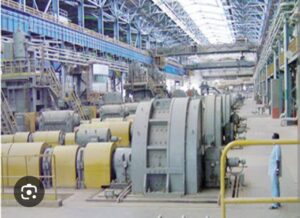

By Dada Ahmed, Lokoja.

The week of September 14-21, 2024, marks a pivotal moment in Nigeria’s long-held aspirations to revitalize the Ajaokuta Steel Plant, a project that has languished in development for over 40 years. This period represents a significant advance in efforts to rejuvenate the nation’s steel industry, as the Minister of Steel Development, Prince Shuaibu Abubakar Audu, signed a historic Memorandum of Understanding (MoU) with a Russian consortium, led by Tyazhpromexport (TPE), in Moscow.
This agreement aims to rehabilitate, complete, and operate both the Ajaokuta Steel Plant (ASP) and the National Iron Ore Mining Company (NIOMCO) in Kogi State. The signing of the MoU is part of President Bola Ahmed Tinubu’s Renewed Hope Agenda, highlighting the government’s commitment to industrialization and economic progress.
The groundwork for this agreement was laid in July 2023 during the Russia-Africa Summit, where Vice President Kashim Shettima called for renewed efforts to kickstart the steel project. Following preliminary inspections by Russian experts in August 2024, the consortium’s commitment became clear, leading to this significant signing.
Minister Audu expressed optimism about the MoU’s potential to establish a sustainable industrial base in Nigeria, stating, “This is a bold step toward realizing our vision for a revitalized steel sector that will drive economic growth.” The Nigerian delegation’s discussions with Russian officials, including Deputy Minister of Industry and Trade Alexey V. Gruzdev, reaffirmed the consortium’s readiness to achieve the MoU’s objectives.
The revival of the Ajaokuta Steel Plant is projected to generate over 500,000 direct and indirect jobs, significantly boosting Nigeria’s economy. By reducing the country’s reliance on annual steel imports—currently valued at over $4 billion—this initiative aims to conserve foreign exchange reserves and enhance self-sufficiency in steel production.
The consortium leaders, including Mr. Egorov Sergei Anatolevich of TPE, emphasized the project’s critical role in Nigeria’s economic development and the need for an enabling environment to facilitate its success.
Historically, the Ajaokuta Steel Plant was established in the late 1970s but has since remained dormant. Currently, Nigeria consumes approximately 6 million metric tonnes of steel annually, relying heavily on imports. The revival is expected to boost domestic production significantly, potentially fulfilling up to 60% of national demand and creating a ripple effect across various sectors.
As the Tinubu administration pushes for this revitalization, the anticipated job creation spans a range of roles: from skilled engineers and technicians to support staff involved in project management and quality control. The economic benefits extend beyond immediate job opportunities, fostering local community stability through increased disposable incomes and improved infrastructure.
In summary, the revival of the Ajaokuta Steel Plant stands as a testament to the collaboration between Nigeria and Russia, promising a new era of industrial growth and economic self-sufficiency. If realized, this project could transform not only Kogi State but the entire nation, driving technological advancement and sustainable economic development.


